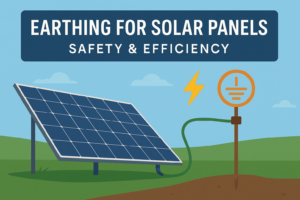
Earthing for solar panels is a critical part of any solar power installation. Whether it’s a residential rooftop system or a large-scale solar farm, a proper earthing system ensures safety, system performance, and regulatory compliance.
In this blog post, we’ll explain:
-
What earthing is
-
Why solar panels need earthing
-
Types of earthing systems used
-
Key components
-
Best practices for solar earthing
What is Earthing?
Earthing (or grounding) is the process of connecting parts of an electrical system to the earth. This creates a path for fault current to safely discharge into the ground, protecting equipment and people.
Why Earthing is Important for Solar Panels
Here are the top reasons why earthing for solar panels is essential:
-
Electrical Safety: In case of a short circuit or lightning strike, earthing protects users and equipment.
-
System Protection: Prevents damage to inverters, panels, and connected appliances.
-
Lightning Protection: Minimizes the risk of electrical surges during storms.
-
Compliance: Meets BIS, IEC, and other national/international safety standards.
-
Improved Efficiency: Reduces electrical noise and voltage fluctuations, enhancing system performance.
Types of Earthing Systems for Solar Installations
Solar installations can use different types of earthing, depending on the size and location of the system:
-
TN-S or TN-C Systems (common in grid-connected setups)
-
TT Systems (popular in rural areas)
-
IT Systems (used in isolated or sensitive applications)
A professional assessment will determine the most suitable system.
Key Components of Solar Earthing
A good solar earthing system typically includes:
-
Copper-bonded earthing electrodes
-
GI or copper earthing strips
-
Backfill compound (BFC) for reducing soil resistance
-
Test links and inspection chambers
-
Lightning arrestors (for full protection)
📌 You can explore Acti1 Earthing Products for reliable and certified components.
Best Practices for Earthing Solar Panels
To ensure an effective earthing system:
-
Conduct a soil resistivity test before installation
-
Maintain resistance below 1 ohm for optimal performance
-
Use anti-corrosive materials for durability
-
Perform regular testing and maintenance
-
Follow local electrical codes and safety standards
Choose Acti1 for Solar Earthing Solutions
At Acti1 Earthing, we specialize in high-performance earthing systems tailored for solar energy projects. Our products are:
-
Tested and certified
-
Corrosion-resistant
-
Easy to install
-
Cost-effective
Whether you’re an EPC contractor, developer, or solar panel installer, we’re here to help you build safer and more efficient systems.
📞 Contact us today to get a quote or technical guidance.
Conclusion
Investing in proper earthing for solar panels is not just about compliance—it’s about protecting your investment and ensuring long-term performance. Don’t overlook this crucial component in your solar energy system.
